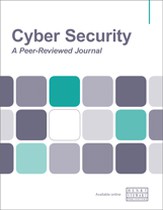Managing stakeholder communication during a cyber crisis
Abstract
The paper examines the impact on stakeholders during cyber crises and how failing to engage with them can quickly escalate a crisis into a reputation train wreck. While organisations must focus their efforts on preventing and mitigating cyberattacks, it is not always possible to fix the problems when they occur and in some cases it may take weeks or months before the issue is resolved. If the affected organisation does not own up and communicate quickly with its stakeholders, this communication vacuum period can seriously erode stakeholder confidence and ultimately destroy the organisation’s reputation. Using the famous The Good, the Bad and the Ugly film metaphor, this paper delves into three recent cyber crisis examples to define what was done well, which was a badly handled case, and which was a truly ugly one to draw best-practice lessons. Recognising that stakeholders are at the core of our organisations’ echo system is a good place to start. By identifying and mapping them in order of importance, degree of influence and threat level, the organisation can develop engagement strategies that are designed to yield measurable results. Furthermore, the stakeholder mapping process helps uncover opportunities as well as worst-case scenarios that can be prepared for and help weather the storm. Ultimately, stakeholder outrage can drive crises into reputation meltdowns and the ability to communicate swiftly, transparently and credibly is the cornerstone of any effective crisis response strategy, but especially cyber ones where there are seldom quick fixes. The ability to retain stakeholder trust in the midst of adversity and chaos underpins the organisation’s capacity to protect its reputation and possibly emerge stronger on the other side.
The full article is available to subscribers to the journal.
Author's Biography
Caroline Sapriel is the Founder and Managing Partner of CS&A International, a global risk and crisis management consulting company working with multinational clients across industry sectors in Asia, the Middle East and Africa, Europe and the Americas. With over 25 years’ experience in risk and crisis management, she is recognised as a leader in her profession and acknowledged for her ability to provide customised, results-driven counsel and training at the highest level. Over the years, Caroline has advised senior leaders across industries internationally. Her multidisciplinary background and experience has enabled her to provide clients with an in-depth analysis of their crisis management capability as well as help them develop effective risk and crisis response organisations and stakeholder and reputation management strategies. She has been directly involved in helping clients manage crises in the oil and gas, chemical, transport, shipping, aviation, pharmaceutical and consumer product sectors. Caroline is an accomplished trainer, facilitator and coach in risk issues and crisis management as well as in communication skills, and a regular speaker on risk and crisis management at international conferences. She has published articles and co-authored two books on crisis management as well as contributed the chapter on crisis communication to the International Association of Business Communicators’ Handbook of Organizational Communication. She is a lecturer on crisis management at the University of Antwerp and the University of Leuven in Belgium as well as the University of Leiden in the Netherlands. Caroline is fluent in French, English, Spanish, Hebrew and Mandarin. She holds a BA degree in Chinese studies and a BSc degree in international relations from the Hebrew University of Jerusalem.
